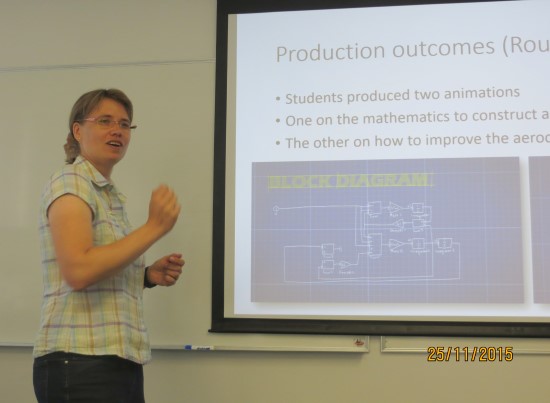25 November 2015: Seminar by Associate Professor Birgit Loch, Swinburne University of Technology, Australia “Involving students in making mathematics relevant to first-year engineering students”
Abstract: We have observed that first-year mathematics study is often seen as irrelevant and distracting by engineering students who are more interested in applied engineering subjects. Many disengage for this reason, perform in mathematics at levels below their capabilities, and struggle later on when the first year material becomes prerequisite to further studies. In this presentation I will talk about the "Mathematics Relevance Project", a research project to investigate how to get engineering students to understand the relevance of their first year mathematics topics. This project takes a novel angle by involving higher year students in the production of re-usable resources for first year students. These higher year students are recruited from engineering degrees, but also from multi-media degrees to ensure a quality outcome. Two iterations of this project have been completed now, resulting in six animations describing a range of mathematical topics needed to construct a high-rise building or to improve the aerodynamics of a car, or focusing on individual topics needed for cruise-control of a car, ECGs, breaking down of alcohol in the body, and moving a robot. The six existing, and all future animations and films, may be accessed by going to http://commons.swin.edu.au, proceeding as guest, and searching for "relevance".
About the speaker: Birgit Loch has a PhD in computational mathematics and is Associate Professor at Swinburne University of Technology. She was the head of the Maths and Stats Help Centre for five years. As Academic Director Digital Learning & Technologies she has been leading the first stage of the blended learning project in the Faculty of Science, Engineering and Technology. Birgit has taught engineering mathematics in online and face to face modes with tablet technology for the last 11 years, pioneering its use and currently leading the involvement of colleagues across all STEM disciplines at Swinburne University. Her research focuses on the effective use of educational technologies such as tablets and screencasting to improve student learning in STEM education, the engagement of academics in the use of technologies for teaching, and the involvement of students as co-producers of learning resources.
Email:
